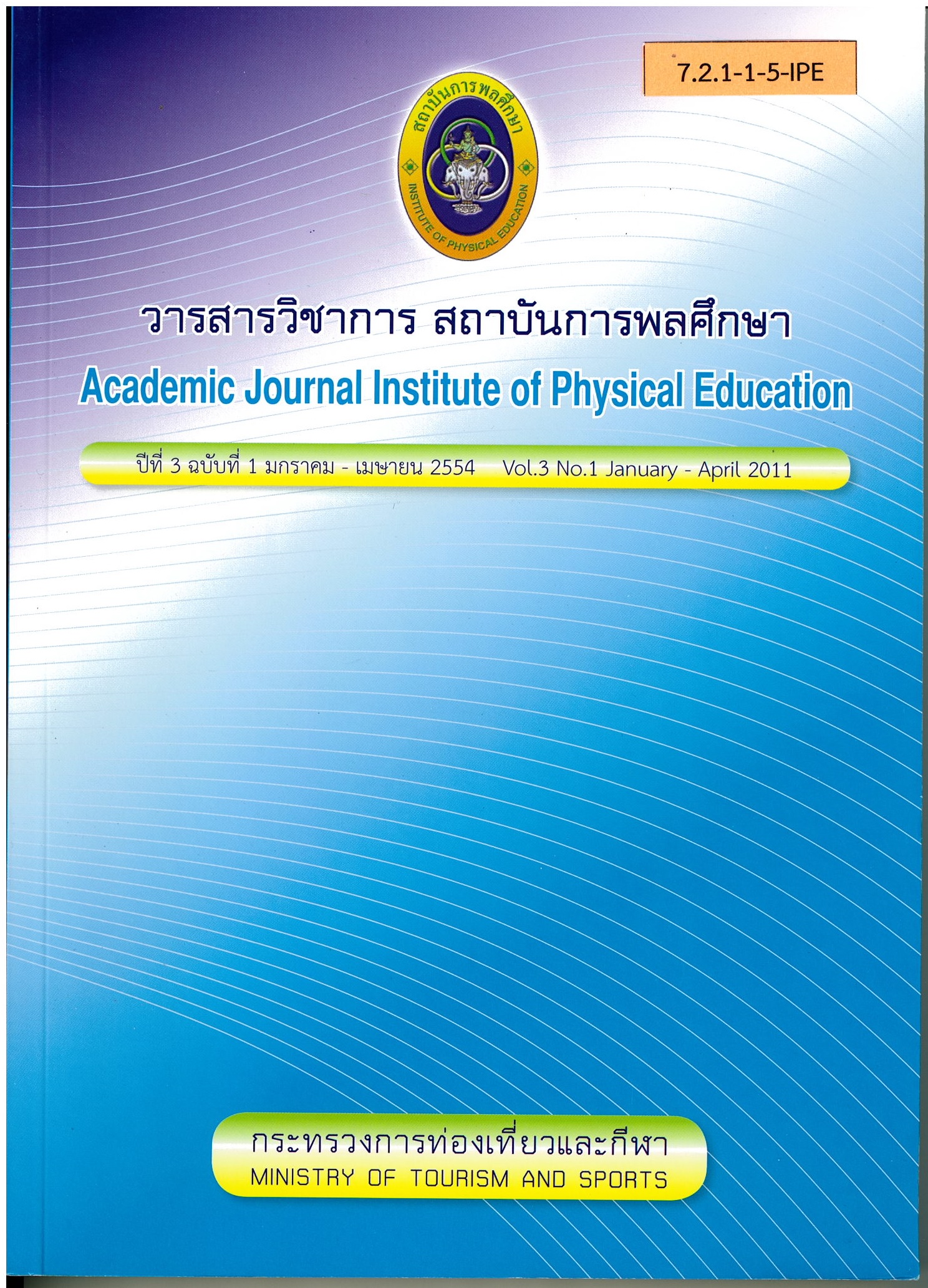he Development of Web Based Instruction on Education Innovation and Technology
Main Article Content
Abstract
The research aimed to develop the efficiency of the Web Based Instruction on Education Innovation and Technology not less than 80/80, to compare the students learning achievement both before and after studying the lesson. And to find out the students satisfaction to the Web Based Instruction on Education Innovation and Technology. The population of the research were 61 first year students of Bachelor in Institute of Physical Education Chumphon, semester I, academic year 2008. The sampling group were 30 first year students of Faculty of Education academic year 2551 by Purposive Sampling. The tools used for this research were the web based instruction on Education Innovation and Technology, learning achievement test and the students satisfactory Evaluation form. The statistics used for this research were description statistics including: Percentile, Mean, Standard Deviation and E1/E2 value. The statistics to analyze the data of the learning achievement among before and after studying was the t-test Dependent Sampling.
The results of the research were as the following:
- The E1/E2 efficiency of the Web Based Instruction on Education Innovation and Technology was 85.62/82.79
- The students learning achievement after learning through the Web Based Instruction on Education and Technology was better than before learning at significantly 0.01
- The satisfaction of students who study the Web Based Instruction on Education Innovation and Technology was at excellence level.
Article Details
The published article is a copyright of the Academic Journal of Thailand National Sports University. The passage appeared in each article in this academic journal is a perspective of each author which is not related to the journal. Each author is required to be responsible for all components of his/her own article. If there are any mistakes, each author must be responsible for those mistakes on his/her own.
References
ชัยอนันต์ สมุทรวณิช. (2540). วิสัยทัศน์ในการพัฒนาประเทศในศตวรรษที่ 21: สู่ความเสมอภาคทางความแคล่วคล่องทางด้านเทคโนโลยี ในเอกสารประกอบการสัมมนาเรื่องอิทธิพลและทิศทางมัลติมีเดียกับสังคมไทย. กรุงเทพฯ: กระทรวงวิทยาศาสตร์เทคโนโลยีและสิ่งแวดล้อม.
นฤมล รอดเนียม. (2546). บทเรียนการสอนผ่านเว็บ เรื่องอินเทอร์เน็ต วิชาเทคโนโลยีสารสนเทศวิทยานิพนธ์วิทยาศาสตรมหาบัณฑิต สาขาวิชาวิชาการศึกษาวิทยาศาสตร์ บัณฑิตวิทยาลัย, สถาบันเทคโนโลยีพระจอมเกล้าเจ้าคุณทหารลาดกระบัง.
บุปผชาติ ทัฬหกรณ์. (2546). เทคโนโลยีสารสนเทศทางวิทยาศาสตร์ศึกษา. กรุงเทพฯ : มหาวิทยาลัยเกษตรศาสตร์.
ปรัชญนันท์ นิลสุข และคณะ. (2551). รูปแบบการพัฒนาสื่อการเรียนการสอนผ่านเว็บโดยครูต้นแบบของสํานักงานคณะกรรมการอาชีวศึกษา” วารสารวิชาการพระจอมเกล้าพระนครเหนือ. (18)2, 53.
รุจโรจน์ แก้วอุไร. (2543). การพัฒนาการเรียนการสอนผ่านเครือข่ายใยแมงมุม. ปริญญานิพนธ์การศึกษาดุษฎีบัณฑิต มหาวิทยาลัยศรีนครินทรวิโรฒ ประสานมิตร.
วรวุฒิ มั่นสุขผล. (2545). การพัฒนาบทเรียนบนเว็บ วิชาคอมพิวเตอร์เพื่อการศึกษา วิทยานิพนธ์ปริญญาศึกษาศาสตรมหาบัณฑิต สาขาวิชาเทคโนโลยีการศึกษา), นครปฐม : บัณฑิตวิทยาลัยมหาวิทยาลัยศิลปากร, ถ่ายเอกสาร.
ศูนย์เทคโนโลยีทางการศึกษา. (2545). แนวทางปฏิรูปเทคโนโลยีเพื่อการศึกษา. กรุงเทพฯ: กราฟฟิค โกร.
สถาบันการพลศึกษา. (2550). ยุทธศาสตร์สถาบันการพลศึกษา (พ.ศ. 2550 - 2555). กรุงเทพฯ: สถาบันการพลศึกษา กระทรวงการท่องเที่ยวและกีฬา.
สํานักงานคณะกรรมการการศึกษาแห่งชาติ. (2542). พระราชบัญญัติการศึกษาแห่งชาติ. Retrieved from http://www.onec.go.th/Act/law2542/sa_law2542.pdf
สํานักงานคณะกรรมการพัฒนาเศรษฐกิจและสังคมแห่งชาติ. (2550). แผนพัฒนาเศรษฐกิจและสังคมแห่งชาติ Retrieved from http://www.nesdb.go.th/Default.aspxtabid=139
อาทิตย์ สมบูรณ์วงศ์. (2547). การพัฒนาบทเรียนบนเว็บ เรื่องกฎหมายธุรกิจ สําหรับพนักงานธนาคารนครหลวงไทยจํากัด (มหาชน), วิทยานิพนธ์ปริญญาศึกษาศาสตรมหาบัณฑิต สาขาวิชาเทคโนโลยีการศึกษา), นครปฐม : บัณฑิตวิทยาลัย มหาวิทยาลัยศิลปากร. ถ่ายเอกสาร.
Candy, Philip C. (1991). Self - Direct for Lifelong Learning. San Francisco : Jossey - Bass Publisher.
Dixon, W.B. (1992). An Exploration Study of Self - directed Learning Ruddiness and Pedagogical Expectation about Learning among Adult Imamate Learners in Michigan. Doctoral dissertation, Michigan State University, Dissertation Abstracts International. 55/07 (1995): 1789.
Gagne, R., Briggs, L.&Wager, W. (1992). Principle of Instructional Design. Retrieved from http://www.tip.psychology.org/gagne.html
Skinner, B.F. (1972). Beyond Freedom and Dignity. New York : Alfred A. Knopf.
Zhao. Yong. (1998). “Design for Adoption : The Development of an Integrated Web - based Education Environment." Journal of Resraech on Computing in Education. 17(3): 113 - 132.


